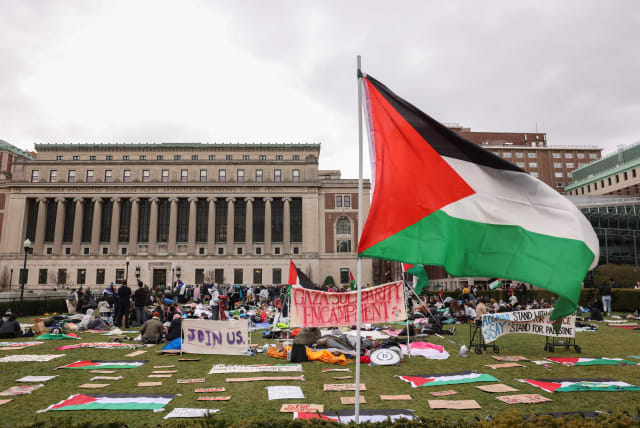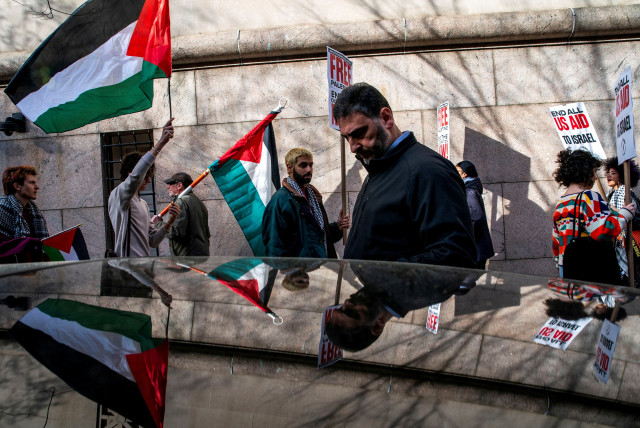Only unity can combat anti-Jewish hate on campuses - editorial

The measures taken by university administrators, including the suspension of protesters, seem to fan the flames further.
The anti-Israel protests on major US campuses are spiraling out of control and the authorities must put a lid on them now before it is too late.
On the Manhattan campus of Columbia University, where protesters established a pro-Palestinian tent encampment almost two weeks ago, dozens of students occupied Hamilton Hall – one of the buildings occupied during the 1968 student protests against the Vietnam War – smashing windows with hammers and unfurling an “Intifada” banner. Hours earlier, the university announced it was suspending students who refused to leave the encampment before a 2 p.m. Monday deadline.
Universities have struggled to contain the protests at campuses across the United States for more than a week, claiming that they seek to balance free speech rights while limiting disruptions to studies.
In reality, however, legitimate protests calling for a halt to the war in Gaza have morphed into “Free Palestine” hate fests against Israel’s existence. The measures taken by university administrators, including the suspension of protesters, seem to fan the flames further.
Model for handling protests
The University of Texas at Austin, however, proved that a tough approach can work. Its handling of the protests should be a model for others. On Friday, it placed its Palestine Solidarity Committee (PSC) chapter on interim suspension, citing its involvement in the anti-Israel protest that caused chaos on campus.
The group organized a demonstration last Wednesday where more than 500 students walked out of class, ostensibly to demand that UT-Austin divest from manufacturers supplying Israel with weapons used in Gaza. This was immediately met with a forceful police response as scores of riot police deployed to the campus. They cleared the protest and made more than 55 arrests.
In a post on Instagram, the PSC claimed that its suspension was “an attack on free speech to distract from and enable Israel’s genocidal campaign against the Palestinian people” and slammed UT Austin President Jay Hartzell and Republican Governor Greg Abbott for authorizing the action against the protest.
“No encampments will be allowed,” Abbott posted on X, sharing a video of riot police with batons moving toward the protesting students. “Instead, arrests are being made.” Hartzell defended the use of force in an e-mail on Thursday, noting that most of those arrested were not even affiliated with the university.
“The university’s decision to not allow yesterday’s event to go as planned was made because we had credible indications that the event’s organizers, whether national or local, were trying to follow the pattern we see elsewhere, using the apparatus of free speech and expression to severely disrupt a campus for a long period,” he wrote.
University spokesman Brian Davis told The New York Times that activists had physically and verbally assaulted staff who sought to confiscate tents, and that “baseball-sized rocks” were found at the encampment.
Anti-Israel protests and encampments, organized by pro-Palestinian groups funded by Qatar, PSC and others, have sprung up at several Ivy League campuses. Unless there is a tough policy, the protesters are not deterred.
While Harvard suspended its PSC chapter last Monday for the rest of the spring semester, for example, it allowed students to build a tent encampment two days later
Prime Minister Benjamin Netanyahu was right to speak out about the campus protests last week, appealing to Jews and non-Jews alike who are concerned about our common future to “stand up, speak up, be counted. Stop antisemitism now!”
He declared: “What’s happening in America’s college campuses is horrific. Antisemitic mobs have taken over leading universities. They call for the annihilation of Israel. They attack Jewish students. They attack Jewish faculty.”
University authorities in the US must heed the call to halt these well-funded, well-organized campus protests, but for the sake of the students trying to study, those who will be the leaders of tomorrow, it is also vital that Israel, American Jewish organizations, Israel supporters, and individual donors of all faiths join to help the universities stop the spread of the protests.
Only a show of strength and unity can combat the wall of hate being hoisted in front of Jewish students across the US.
Jerusalem Post Store
`; document.getElementById("linkPremium").innerHTML = cont; var divWithLink = document.getElementById("premium-link"); if (divWithLink !== null && divWithLink !== 'undefined') { divWithLink.style.border = "solid 1px #cb0f3e"; divWithLink.style.textAlign = "center"; divWithLink.style.marginBottom = "15px"; divWithLink.style.marginTop = "15px"; divWithLink.style.width = "100%"; divWithLink.style.backgroundColor = "#122952"; divWithLink.style.color = "#ffffff"; divWithLink.style.lineHeight = "1.5"; } } (function (v, i) { });

